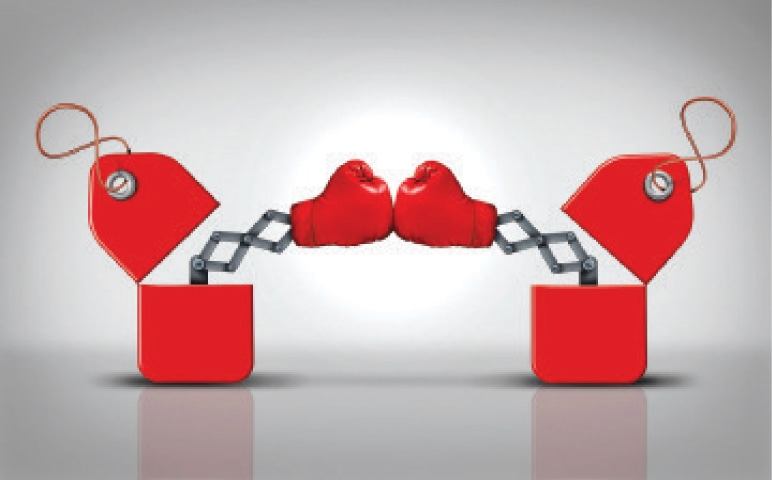
THE Eid proved to be sweeter and merrier for the local providers of goods and services as their share in the market increased significantly. The sectors that suffered the most during the past two Eids bounced back with a bang this year and more than made up for whatever they had missed previously.
Early estimates based on market sources indicate a gain of 10 per cent in the pie for the local producers as the balance tipped in their favour compared to the imports that dipped in proportionate terms. Eateries, transport, entertainment, groomers, tailors, children’s wear, apparel brands and home-based enterprises did exceptionally well this year.
The limited accessibility and higher prices of popular imported items — children’s wear, shoes, electronics, accessories, etc — on account of higher duties, rupee depreciation, supply chain disruptions and higher cost of logistics opened up market space for the local suppliers waiting in the wings to pounce on the opportunity and grab what they consider naturally theirs.
“I hope and wish Pakistani manufacturers build on this gain and meet customers’ expectations of a good deal in terms of choices, quality and prices. It was sad to watch foreign competitors capitalising on the spurt in consumer spending on the festive occasion, beating the locals on their home ground.
Brand Pakistan did remarkably well compared to the imported stuff during the recent Eid season
“The Covid pandemic had shaken businesses at their very core. The more futuristic ones probably decided to build back better to succeed. Improvement in the quality of products and the attractive prices together nudged the customers towards shedding their fascination with imported stuff and buying Pakistani products. The recent spike in the spirit of nationalism, particularly among the youth, might also have contributed to the trend,” observed an executive of a local footwear manufacturer.
Some market-watchers feel that business could have been even better had the elite been more involved. “The big budgets for holiday plans abroad this year after two long Covid years meant the rich emptied their wallets elsewhere. Their absence was felt in the market which graciously rewarded the losers of the last two years, such as restaurants/hotels, transport, grooming, tailoring services, mid-level brands and items marketed by home-based enterprises,” said an analyst.
Retail market expert Abid Umer, commenting on the defining dynamics of the market this year, said: “Consumers felt the impact of inflation… their focus remained on essentials with the major wallet share going to gifts as the good times were back with a vengeance and people were clearly looking forward to meet, greet and catch up with friends and family both near and far.
“The impact on imported products has primarily been due to supply chain disruptions and devaluation that pushed the prices beyond the reach of the consumers, changing the target audience demographic. Many rich Pakistanis are also looking forward to travelling again, and hence saving up for that.”
On the specifics of losers and gainers this year, he said it was hard to assess with confidence in the absence of dependable data. However, he agreed that the local products did better than before in the Eid market compared to the imports.
He also pointed out an area that deserves immediate attention. “The infringement of intellectual property rights in Pakistan, including some known business groups, cannot be defended. It discourages brands like Disney, Marvel, Barbie, Mattel etc to enter the Pakistani market officially. This also robs us of an opportunity to produce these brands here officially and export them to global markets worldwide.”
Majyd Aziz, former president of the Employers Federation of Pakistan, attributed the big market of Chinese items to dumping — which, in layman terms, means selling below the cost of production — in connivance with local traders willing to go to any length for quick bucks. He mentioned the misuse of dry ports. “Pakistan is probably the only country where even imported consignments are facilitated at the dry ports.”
Commenting on the depressed share of imported goods, he said: “The Customs authorities and border security personnel are now vigilant and proactive in controlling the influx of goods, especially from India, Iran and China. It is reflected in the large increase in official imports from China. Besides, higher freight costs and Covid SOPs discouraged many businessmen and Kheppias from visiting overseas to buy stock lots. The tough measures are working and the higher duties would further deter traders and kheppias from unbridled excessive imports”.
He also suggested burning all confiscated imports to reduce the chances of such stocks entering the market.
Anjum Nisar, former president of the Karachi Chamber of Commerce and Industry, was not in the country but shared his thoughts on the issue with Dawn. “Restaurant business is back to normal. In fact, online deliveries and booming late-night business during Ramadan and Eid have made the outlook even rosier”.
He mentioned the new labelling requirement in the Urdu language on imported goods as another factor controlling the sale of imported items in Pakistan. He expected the food business to continue doing better due to the massive increase in overseas travelling costs post-pandemic.
Published in Dawn, The Business and Finance Weekly, May 9th, 2022















































Dear visitor, the comments section is undergoing an overhaul and will return soon.